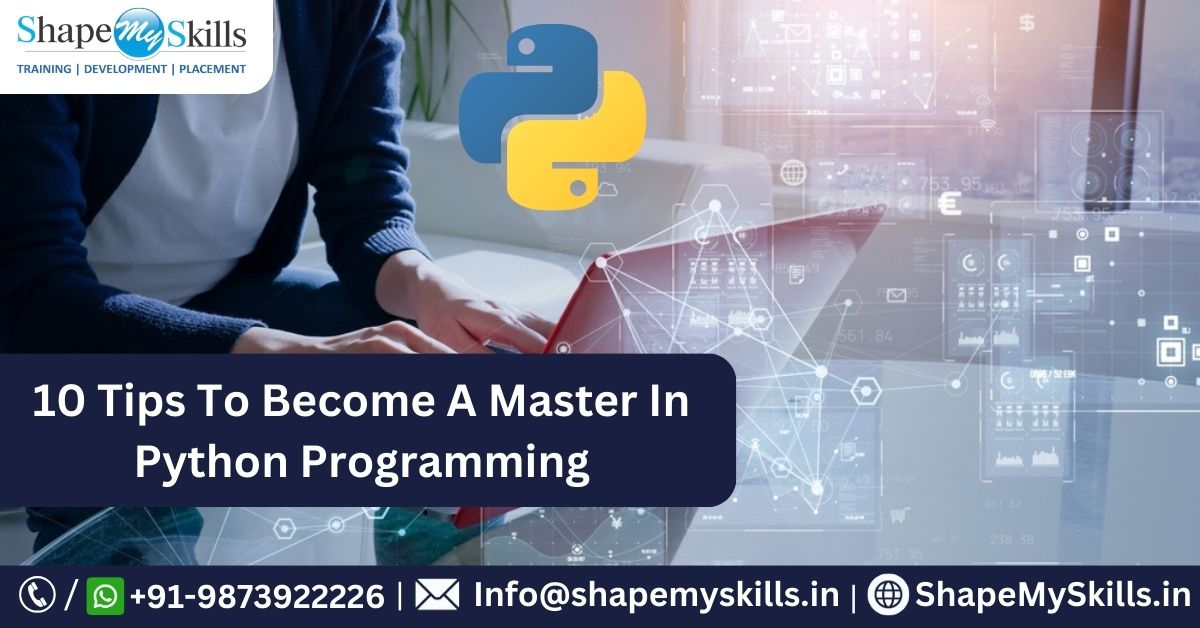Can Machines Really Make Predictions? Magic of Machine Learning
…

Python is one of the most popular and versatile programming languages used by developers worldwide. Known for its simplicity, readability, and vast community support, Python is an excellent choice for both beginners and seasoned programmers. Becoming a master in Python programming requires dedication, practice, and continuous learning. While you can certainly teach yourself Python using online tutorials and resources, enrolling in structured Python Training in Noida can significantly accelerate your journey and provide a solid foundation for your programming career. Whether you are just starting your Python journey or looking to enhance your skills, here are ten tips to help you become a master in Python programming:
Begin your Python journey by mastering the fundamentals. Understanding data types, variables, loops, conditionals, and functions thoroughly is crucial. A solid foundation is essential as it forms the building blocks for advanced concepts you will encounter later. Take your time to grasp the basics, and don’t rush through this phase. Python Training in Delhi is designed to cover all aspects of the language, from the basics to advanced concepts. A well-structured curriculum ensures that you learn the fundamentals thoroughly before moving on to more complex topics.
Python has a rich ecosystem of libraries that can expedite your development process and make complex tasks easier. Familiarize yourself with essential libraries such as NumPy for numerical computing, pandas for data manipulation and analysis, data visualization, and requests for working with APIs. These libraries will be immensely helpful in various projects and tasks.
The key to mastering Python, like any other skill, is practice. Code regularly, work on mini-projects, and participate in coding challenges or hackathons. Practical applications will enhance your problem-solving abilities and boost your confidence. You can start with simple exercises and gradually move on to more complex projects as you become more comfortable with the language.
Reading and analyzing other programmers’ code can be incredibly enlightening. It exposes you to different coding styles and techniques, helping you learn from experienced developers. Open-source projects on platforms like GitHub can be a great resource for this. By understanding other people’s code, you will not only improve your comprehension skills but also learn how to write more maintainable and efficient code.
PEP 8 is the official Python style guide, and adhering to it is essential for writing clean and readable code. Consistent formatting and naming conventions make your code more accessible to others and yourself in the future. Adhering to PEP 8 will also help you collaborate better with other developers, as your code will be more in line with industry standards.
Python supports Object-Oriented Programming (OOP), a powerful programming paradigm. Learn how to create classes, objects, and inheritance. OOP can help you write more organized and reusable code, especially in larger projects. Understanding the principles of OOP will enable you to design robust and scalable applications that are easier to maintain and extend.
Data persistence is vital in many applications. Learn how to interact with databases using Python’s built-in SQLite module or other popular databases like MySQL and PostgreSQL. Understand how to perform CRUD operations (Create, Read, Update, Delete) and work with Object-Relational Mappers (ORMs) like SQLAlchemy.
Python is widely used in web development. Learn web frameworks like Flask or Django. These frameworks allow you to build robust web applications efficiently. Learning HTML, CSS, and JavaScript will complement your Python web development skills, as they are commonly used in conjunction with Python to create dynamic and interactive web pages.
Becoming a master in Python programming involves mastering the art of debugging and writing effective unit tests. Understanding how to track down and fix bugs will make you a more efficient developer, as debugging is an integral part of the software development process.
Contributing to open-source projects not only gives back to the community but also exposes you to complex codebases and the collaborative nature of software development. It’s an excellent way to learn from experienced developers, understand best practices, and improve your Python skills further. You can start by searching for beginner-friendly projects and gradually take on more challenging tasks as you gain confidence.
Python is a constantly evolving language with frequent updates and new features. Stay curious about the latest trends, improvements, and emerging libraries. Join Python-related forums, follow blogs, attend conferences, and participate in online courses to stay up-to-date with the Python ecosystem. Being proactive in your learning journey will keep you ahead of the curve and ensure you stay relevant in the rapidly changing tech industry. The Best Python Training Institute in Noida, ShapeMySkills brings together like-minded individuals, creating valuable networking opportunities. Connecting with fellow learners, instructors, and industry professionals can lead to collaborations, job referrals, and access to hidden job markets. Networking is a powerful tool in the tech industry, and Python training programs can provide an ideal platform to expand your professional network.
Mastering Python programming requires consistent effort, practice, and an open mind to learning. Embrace challenges, seek out new projects, and engage with the Python community. Python Online Training provides a structured and guided approach to learning the language. It complements self-learning efforts and accelerates your journey to becoming a Python master. By enrolling in a reputable Python training program, you gain access to a comprehensive curriculum, mentorship, hands-on projects, networking opportunities, and industry-recognized certification. Now that you have made up your mind for Python Training here’s All You Need To Know Before Undergoing Python Training. With dedication and passion, you can become a Python master and unlock a world of exciting opportunities in software development. Happy coding!
